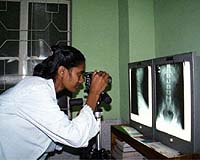 |
New Delhi (AFP) March 31, 2010 Indian outsourcing firms are banking on a business bonanza from US President Barack Obama's landmark healthcare reform as cost pressures prod insurers and hospitals to become more efficient. The 940-billion-dollar US healthcare bill, passed in March, will extend health insurance coverage to 32 million Americans over the next decade and require insurers and medical care providers to cut costs substantially. "The influx of newly insured represents a big, exciting opportunity for the industry," Ananda Mukerji, chief executive officer of Firstsource Solutions, which was an early outsourcing mover in the US healthcare market, told AFP. "These 32 million Americans represent a considerable rise in consumption of healthcare services and the legislation is especially significant with its new limits on how much can be spent on administrative costs," he told AFP. Some of the new work will be customer support, meaning claimants in the US might be connected with Indian call centres that are already popular with banks and insurance companies in the West. But a big chunk of it will be "back office", the administrative processes that underpin the medical system, such as enrolling new claimants in insurance schemes, processing medical claims and transcribing health records. The United States already spends 2.5 trillion dollars on healthcare and the bill will create an additional market of 261 billion dollars, according to the US Centers for Medicare and Medicaid Services. A key provision of the new law -- from which the bulk of outsourcing deals are expected to flow from 2013-14 -- requires insurers to divert much more of premium revenues to healthcare and away from administration. All cost cut angles "must be leveraged including outsourcing and offshoring. This will mean positive momentum for players," said Keshav Murugesh, chief executive of WNS Global Services, a major outsourcer. Administration expenses total as much as 41 percent of US private premium revenues, according to a Deloitte consultancy study. Insurance firms will have to use outsourcing "to do more with less" to retain their profit margins, said Sanjiv Kapur, head of India's Patni Computer Systems' business process outsourcing (BPO) unit. To help cut costs, the US government is requiring all paper medical records be made electronic, offering addition potential to companies such as CBaySystems, which is already the world's largest medical transcriber. Mumbai-headquartered CBaySystems is "geared up" to help healthcare providers automate their processes more and "change from paper records to electronic ones", chief executive Raman Kumar said. Most of the outsourcing will be done in India. But some work will be in the United States in what is known as "onshoring" as US insurers and health care providers turn to companies owned by Indian companies. Some Indian firms have already been ramping up their US presence through acquisitions and joint ventures so they can carry out "onshore" outsourcing within the United States. Part of the reason for this is to prevent criticism of jobs leaving the US for India -- something Obama has publicly attacked as domestic unemployment hovers around 10 percent. "Clearly, there's going to be protectionist sentiment prevailing and for some time in the future until the economy recovers," Mukherji said. Patni Computer Systems, for instance, set up an office in El Paso, Texas, recently after clinching a deal with a US healthcare insurer. Mukherji's Mumbai-based Firstsource, the biggest Indian BPO player in the United States, whose company has 25,000 employees out of which 2,000 already work in servicing healthcare contracts in the United States. A drop in US property and labour costs due to the US economic slump has made servicing outsourcing contracts in the United States much easier, add firms, which say about 15 to 20 percent of their work could be done locally.
Share This Article With Planet Earth
Related Links Hospital and Medical News at InternDaily.com
 Internet connects deepest Nepal to 'telemedics'
Internet connects deepest Nepal to 'telemedics'Kathmandu (AFP) March 31, 2010 Patients in rural Nepal will soon be able to consult specialist doctors over the Internet as part of an innovative scheme to improve health care in remote areas of the Himalayan country. Over the next few weeks, the government will begin connecting 25 district hospitals, most of them located in the rugged and inaccessible Himalayas, to specialist consultants in the capital Kathmandu using sa ... read more |
|
| The content herein, unless otherwise known to be public domain, are Copyright 1995-2010 - SpaceDaily. AFP and UPI Wire Stories are copyright Agence France-Presse and United Press International. ESA Portal Reports are copyright European Space Agency. All NASA sourced material is public domain. Additional copyrights may apply in whole or part to other bona fide parties. Advertising does not imply endorsement,agreement or approval of any opinions, statements or information provided by SpaceDaily on any Web page published or hosted by SpaceDaily. Privacy Statement |